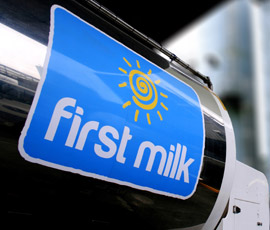First Milk targets more supply chain integration

An ambitious and vigorous programme of “sustainability” will drive First Milk’s future profitability, company boss Kate Allum has told the co-op’s annual conference in Cumbria.
In a hard-hitting address to a packed turnout, she told milk producers that “vertical integration” put First Milk in a unique position to create a more stable and resilient value chain.
“Our global food system is unsustainable. It’s a big contributor to climate change and demand is growing as availability of key resources, including water and productive land, decreases. In many parts of the world food production is already under serious threat,” said Miss Allum.
She told the meeting in Kendal that First Milk was developing a strategy for sustainability for employees and producers as well as key external stakeholders.
Her aim was to create an integrated dairy company that was a preferred supplier and buyer, driven by a passion for innovation and sustainability. The environmental threats triggering the need for greater sustainability must be regarded as an opportunity for First Milk.
“In reality it’s more strength and depth, stronger supply chain relationships and stronger partners. It’s about delivering our aspiration,” said Miss Allum.
Her “strategic drivers” for First Milk remained unchanged – growing brands, diversifying products, customer and market mix, lowering the cost base and getting value from existing and new partnerships.
“All will drive returns for milk producers. But the more we focus on sustainability – and get it right – the more certain our success will be.
“And I stress the word ‘we’ because the more of us that engage in this, the more convinced I am it will bring more opportunities to the business.”
She said First Milk was in a “special position” as a farmer-owned business because it was one team controlling the vast majority of its own supply chain.
“It’s a competitive advantage we must use. But we know from our work over the past two years that there’s no silver bullet, just hard graft to do the right thing at the right time.”
But sustainability must also lead to an improved margin over time.
“When companies trumpet what they do on sustainability, it’s usually around their own manufacturing sites. But even if they get things absolutely perfect on their own sites, it only accounts for a maximum of five percent of the whole supply chain impact.”
Miss Allum listed reducing energy, waste, water usage and packaging among the company’s sustainable targets. “Our cheese packing plant at Maelor sends no waste to landfill and we’ve targeted others to achieve zero waste to landfill during this year.”
Read more news from the First Milk AGM here.
